Swapna Augustine, 41, never complained about her physical condition till the age of 12. Born without both the arms, little Swapna, a native of Paingottoor in Kerala's Ernakulam district, believed that her arms are yet to grow out of her body. At 12, she somehow realised the bitter truth that nothing could be done about her condition and there was no looking back thereafter! An internationally acclaimed painter and the winner of 'Icon of the year 2018' honour by the World Malayali Foundation, Swapna Augustine shares with Onmanorama her story of survival and rise as well as her thoughts on 'disability.'
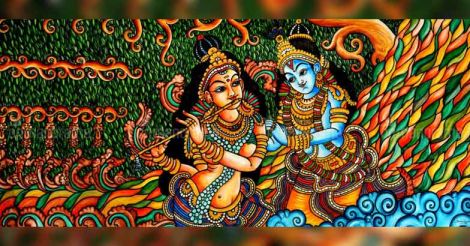 Swapna sells her paintings at the IMPFA forum which pays all its members with a minimal remuration every month regardless of their contribution.
Swapna sells her paintings at the IMPFA forum which pays all its members with a minimal remuration every month regardless of their contribution.Swapna hails from an agrarian family in a hilly village of Kerala's Ernakulam district. Eldest of four children of Augustine and Sophie, Swapna was born without both hands. The baby was short with a disfigured spine. Sophie discovered the condition of her daughter hours after delivery.
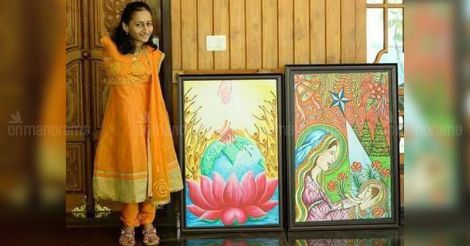 Eldest of four children of Augustine and Sophie, Swapna was born without both hands.
Eldest of four children of Augustine and Sophie, Swapna was born without both hands. "There wasn't enough facilities like scanning way back then. There were literally no means to find out the condition of the baby growing inside you. I was devastated when I had the first sight of my first child. I burst into tears while the baby stayed calm," Sophie remembers.
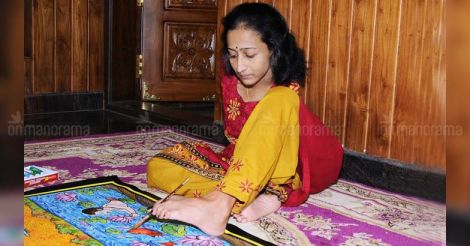 Swapna had dexterity of legs and started performing with them, all what one does with hands.
Swapna had dexterity of legs and started performing with them, all what one does with hands. The couple gave birth to three healthy babies afterwards, two sons and a daughter. Yet, raising a girl child with disabilities gave them a hard time mentally and physically. "I was assisted by my mother for all activities until I turned four. At four, a local tutor (aashan) called Ayyappan started giving me home tuition on how to write holding pencil between toes," Swapna recalled.
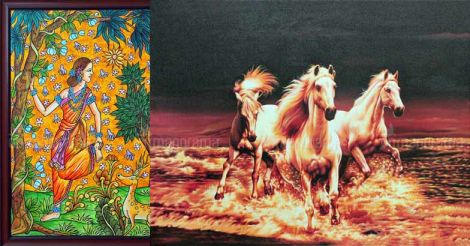 After attending a workshop on painting with acrylic, she adopted professional means and shifted to canvas.
After attending a workshop on painting with acrylic, she adopted professional means and shifted to canvas.Swapna hesitated to continue her classes as her legs didn't bend as she wished and her toes started hurting out of exertion but her parents weren't ready to give up. Within two years, Swapna had dexterity of legs and started performing with them, all what one does with hands.
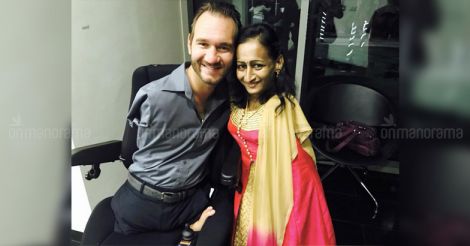 Swapna Augustine with Serbian-Australian motivational speaker Nick Vujicic.
Swapna Augustine with Serbian-Australian motivational speaker Nick Vujicic.At six, little Swapna was sent to a convent boarding for children with disabilities. Sophie remembers the day when Swapna bid bye to her home and left for the care of missionary nuns. "We wanted her to get good education and training to lead a life of her own. Augustine and I suppressed our sorrows and anxiety about her future," she says. But Swapna acquired a great training under the nuns. With a number of other children with similar or worse physical conditions, Swapna learned how to make the best out of her drawbacks.
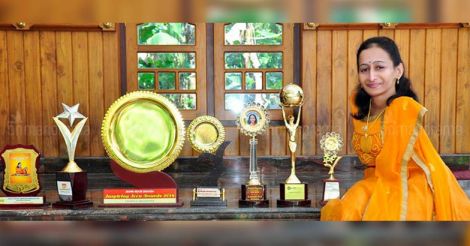 After her graduation in History from St. Mary's college, Enrakulam, Swapna returned home as a painter who was all set to organise an exhibition of her amateur works.
After her graduation in History from St. Mary's college, Enrakulam, Swapna returned home as a painter who was all set to organise an exhibition of her amateur works."We were made to help each other in eating, bed transfers and other daily activities. I'm grateful to Sister Marielle and Sr. Rose of Mercy Home, Changanassery, for what I am today. They taught me the lessons of self reliance and independence," Swapna says.
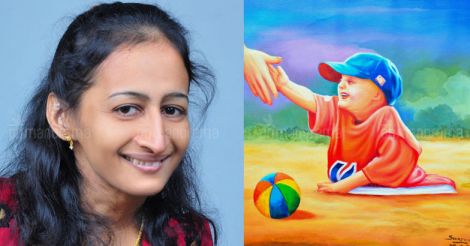 Swapna says that people born with disabilities do not expect sympathy from the mainstream society but expect public places and infrastructure are accessible to them.
Swapna says that people born with disabilities do not expect sympathy from the mainstream society but expect public places and infrastructure are accessible to them.Despite vacation visits thrice a year, Swapna never stayed at her home until she completed her SSLC. Swapna had already started exhibiting her skills in drawing and painting and most of her works portray beautiful flowers, birds and shades of nature. Once her family and boarding authorities discovered her skills in painting, they provided her with chart-papers, colours, brushes and all what it needed to keep her engaged.
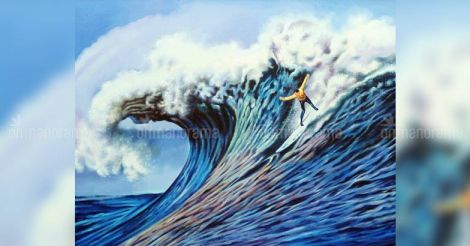 "I think children with disabilities should not be enrolled in special schools unless their condition is that worse. Mingling with the mainstream society will help both the parties accept each other," Swapna says.
"I think children with disabilities should not be enrolled in special schools unless their condition is that worse. Mingling with the mainstream society will help both the parties accept each other," Swapna says.After her graduation in History from St. Mary's college, Enrakulam, Swapna returned home as a painter who was all set to organise an exhibition of her amateur works.
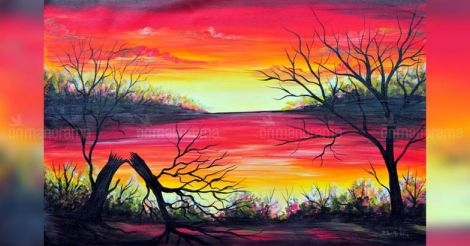 "Our association has people with inspiring stories of survival. A mouth painter who has a body paralysed neck down needs, at least, two people around him while he prepares an artwork. I am at least accustomed with my condition and can serve all my needs alone. I feel blessed for not being a dependent," she says.
"Our association has people with inspiring stories of survival. A mouth painter who has a body paralysed neck down needs, at least, two people around him while he prepares an artwork. I am at least accustomed with my condition and can serve all my needs alone. I feel blessed for not being a dependent," she says.After attending a workshop on painting with acrylic, she adopted professional means and shifted to canvas. No later, she was introduced to a community of mouth and foot painters in Kerala by one of her friends. From there she was selected as one among the 27 Indians and nine Keralites to get a membership in the International Mouth and Foot Painting Artists' Association (IMPFA.)
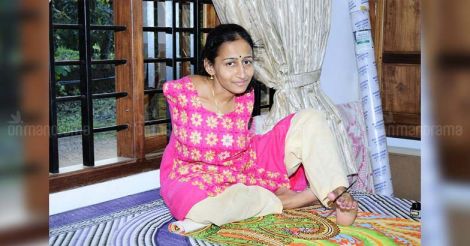 Swapna also gives motivational talks to students and holds live painting displays.
Swapna also gives motivational talks to students and holds live painting displays. Swapna sells her paintings at the forum which pays all its members with a minimal remuration every month regardless of their contribution. IMPFA also organises frequent meet-ups of their members to share their ideas and let inspire each other.
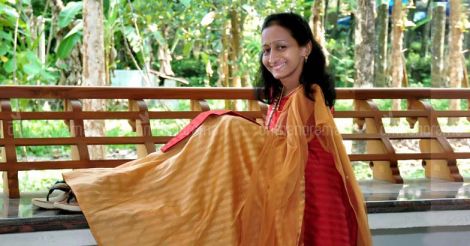 "My greatest strength and source of motivation had been my father who passed away five years ago. Pappa never allowed me to feel that I am a person lacking something," says Swapna.
"My greatest strength and source of motivation had been my father who passed away five years ago. Pappa never allowed me to feel that I am a person lacking something," says Swapna."I was so reluctant to interact with the normal people at a younger age. But all of us at the Mercy Home were sent to usual schools where normal children study. It has enhanced my social interactions. I think children with disabilities should not be enrolled in special schools unless their condition is that worse. Mingling with the mainstream society will help both the parties accept each other," she says.
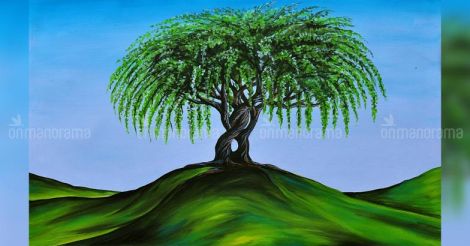 Swapna wishes to continue her journey with the colours in the future too, regardless of future health issues.
Swapna wishes to continue her journey with the colours in the future too, regardless of future health issues. Swapna says that people born with disabilities do not expect sympathy from the mainstream society but expect public places and infrastructure are accessible to them.
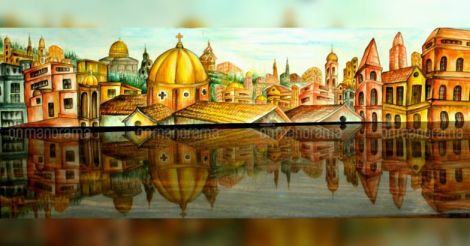 The young artist does not have big dreams about her future. She has got some humble ambitions to fulfill, like a trip to scenic Switzerland to acquire some good inspiration for her paintings.
The young artist does not have big dreams about her future. She has got some humble ambitions to fulfill, like a trip to scenic Switzerland to acquire some good inspiration for her paintings."I know those with spinal cord injuries and are paralysed neck down or waist down. Our association has people with inspiring stories of survival. A mouth painter who has a body paralysed neck down needs, at least, two people around him while he prepares an artwork. I am at least accustomed with my condition and can serve all my needs alone. I feel blessed for not being a dependent," she says.
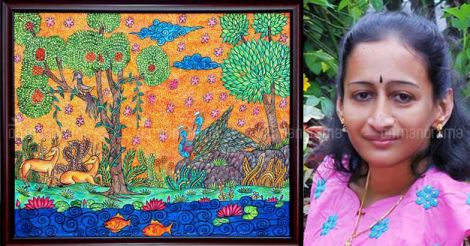 With a proud smile, her mother Sophie says that Swapna offers a big relief to her mind as a supportive daughter.
With a proud smile, her mother Sophie says that Swapna offers a big relief to her mind as a supportive daughter.The young artist does not have big dreams about her future. She has got some humble ambitions to fulfill, like a trip to scenic Switzerland to acquire some good inspiration for her paintings. She wishes to continue her journey with the colours in the future too, regardless of future health issues.
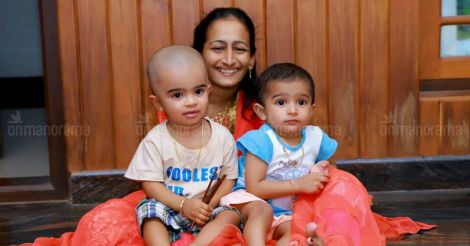 Foot painter Swapna Augustine with her nephews.
Foot painter Swapna Augustine with her nephews.With a proud smile, her mother Sophie says that Swapna offers a big relief to her mind as a supportive daughter. "She helps me out with financial planning and social interactions these days. Once in a while, I feel that the slow growth of technology became a boon. Had scanning been invented back then, we wouldn't have been blessed with our wonder-kid Swapna," Shophie says, patting on her daughter's back.
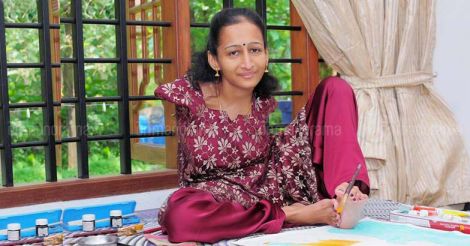 Swapna thanks her parents , siblings and the members of IMFA for her achievements.
Swapna thanks her parents , siblings and the members of IMFA for her achievements. Swapna thanks her parents , siblings and the members of IMFA for her achievements. "My greatest strength and source of motivation had been my father who passed away five years ago. Pappa never allowed me to feel that I am a person lacking something. Though Pappa left this world, my confidence, enthusiasm and calibre keeps him alive among us," Swapna says.
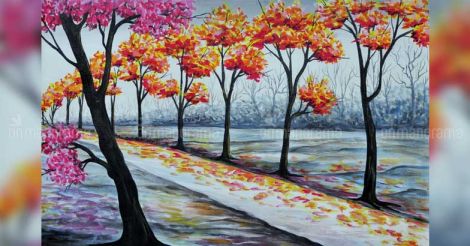 "All of us at the Mercy Home were sent to usual schools where normal children study. It has enhanced my social interactions," Swapna says.
"All of us at the Mercy Home were sent to usual schools where normal children study. It has enhanced my social interactions," Swapna says.Swapna gives motivational talks to students and holds live painting displays.
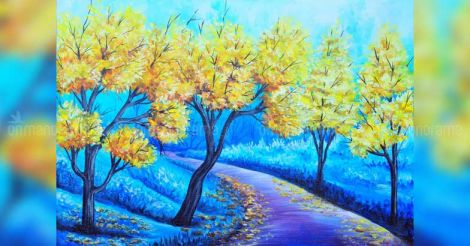 Swapna was introduced to a community of mouth and foot painters in Kerala by one of her friends. From there she was selected as one among the 27 Indians and nine Keralites to get a membership in the International Mouth and Foot Painting Artists' Association (IMPFA.)
Swapna was introduced to a community of mouth and foot painters in Kerala by one of her friends. From there she was selected as one among the 27 Indians and nine Keralites to get a membership in the International Mouth and Foot Painting Artists' Association (IMPFA.) Read | On a Roll | This cancer survivor dances to the tune of confidence

























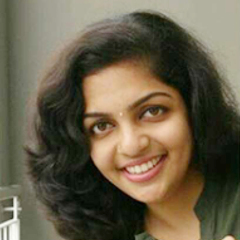
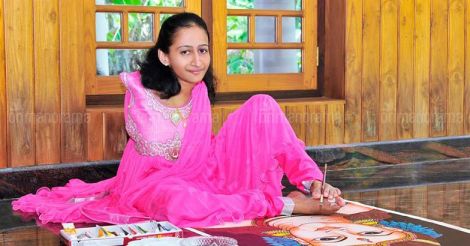 An internationally acclaimed painter and the winner of 'Icon of the year 2018' honour by the World Malayali Foundation, Swapna Augustine shares with Onmanorama her story of survival and rise as well as her thoughts on 'disability.'
An internationally acclaimed painter and the winner of 'Icon of the year 2018' honour by the World Malayali Foundation, Swapna Augustine shares with Onmanorama her story of survival and rise as well as her thoughts on 'disability.'